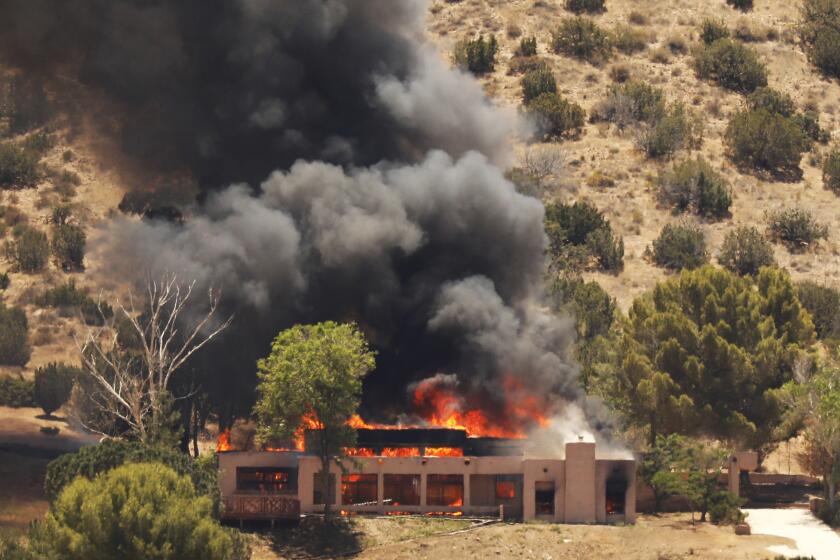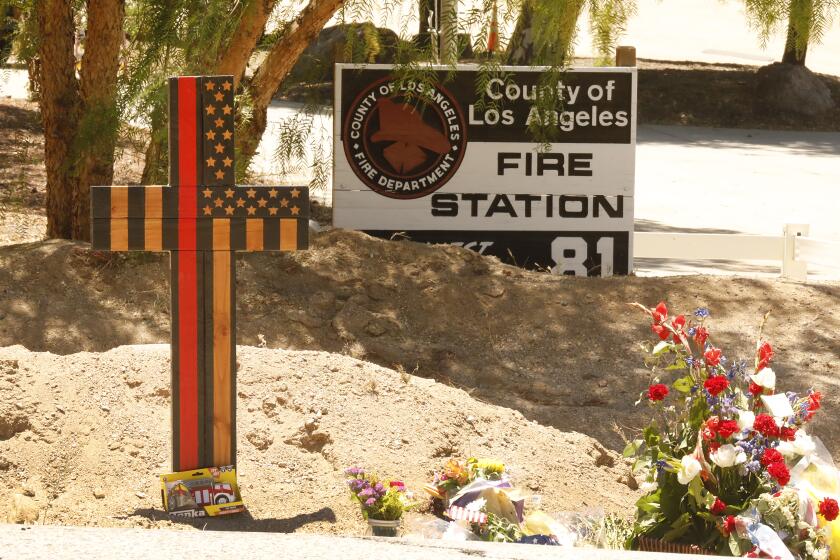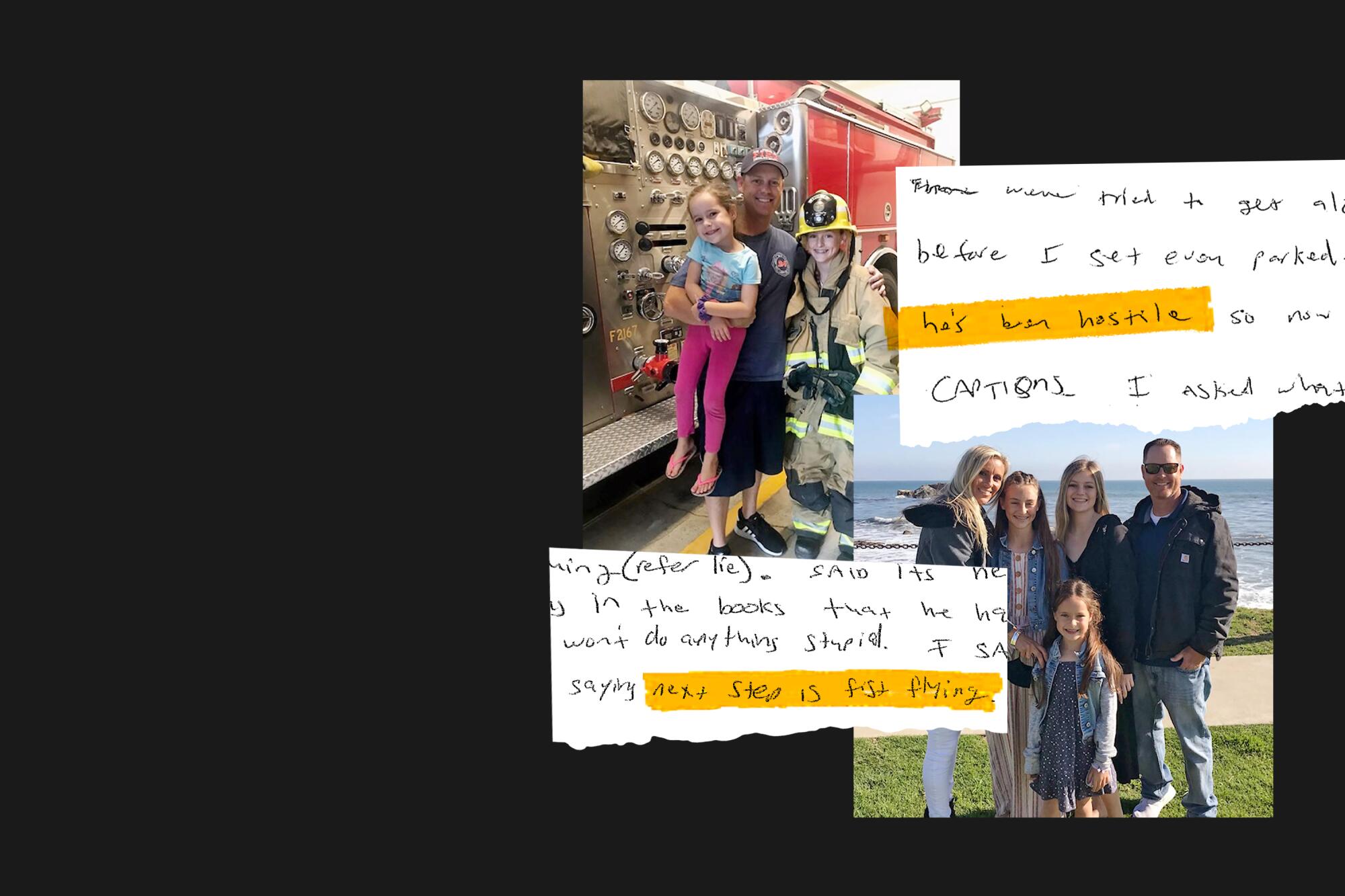
- Share via
The firefighter lay bleeding at the remote station in Agua Dulce. He’d been shot several times, once through the neck.
Tory Carlon moaned in pain. His assailant — a fellow firefighter at Fire Station 81— kept a semi-automatic handgun trained on the 44-year-old sprawled in the engine bay.
“Payback’s a bitch, motherf—!” Jonathan Tatone said.
Carlon had feared this day would come. Over the past two years, he’d been the target of Tatone’s anger.
Constantly on edge, Carlon refused to drink coffee from the communal pot after a shift change, preferring to make a new one. He kept his food in a separate refrigerator in the barn, worried it could be tampered with. He warned his wife when Tatone was off work, fearing he might come by the house and do her harm.
Carlon had voiced his concerns to Los Angeles County Fire Department captains and chiefs, his wife Heidi said, “but nobody did anything.”
On April 29, 2021, he texted his wife about Tatone: “It’s obvious he will not stop harassing me until he hurts me or my family.”
That day came about a month later, on June 1, when Tatone, 45, opened fire at Station 81 off Sierra Highway in what became known as the “Sierra Incident.” Carlon wasn’t the only victim.
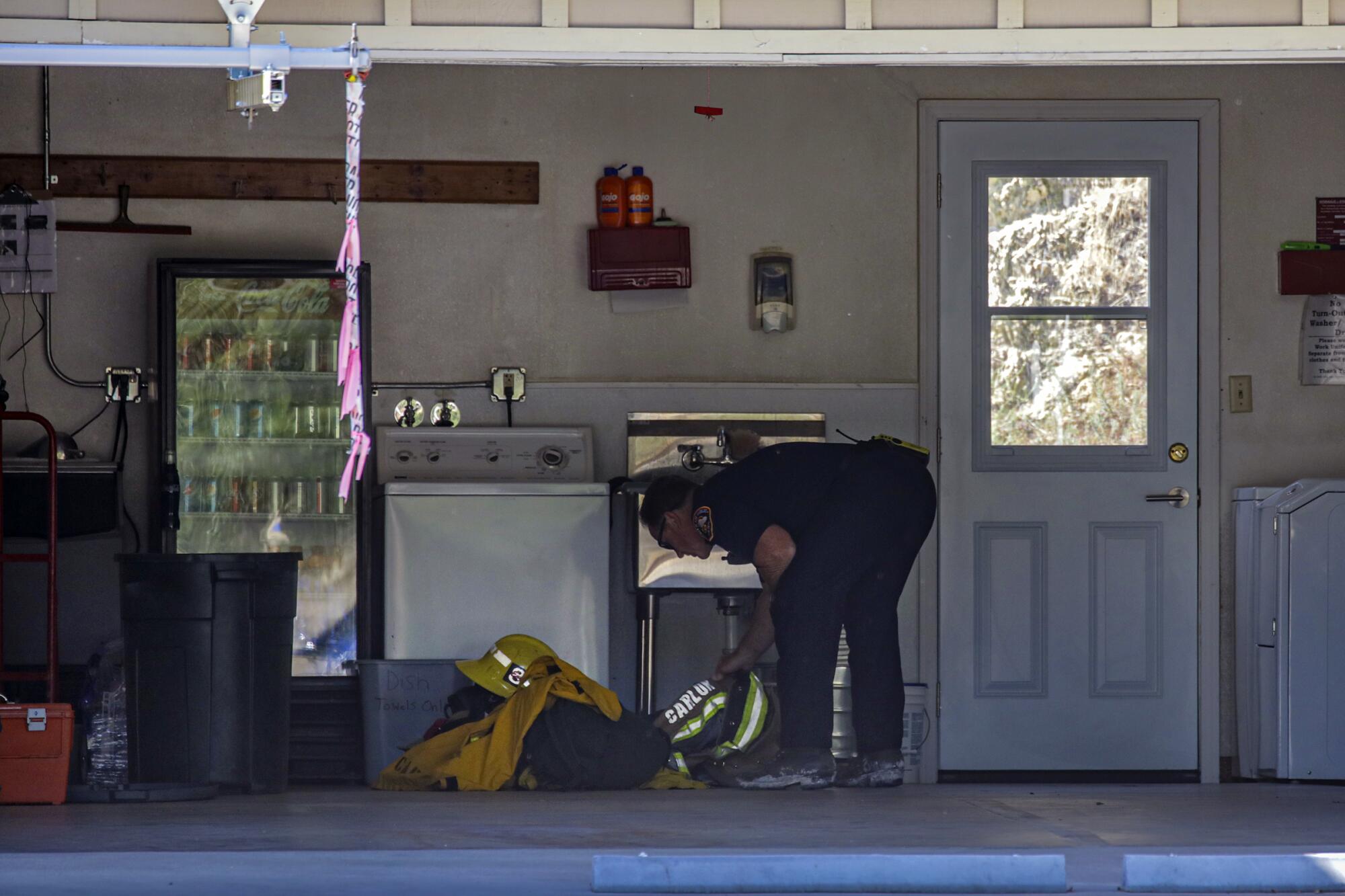
An L.A. County Sheriff’s Department investigative report reviewed by The Times raises questions about how the county fire department — and the county itself — handled the workplace dispute and whether the shooting could have been prevented.
Both the department and the county declined to comment, citing pending litigation.
The report, which includes interviews with the Station 81 fire crew, exposes failures in the lead-up to that bloody June day. Fire captains who brushed off Carlon’s reports of feeling threatened. A battalion chief who forced Carlon and Tatone to have more contact rather than transferring both of them out of the station. A complaint to the county that seemingly went unresolved.
“Nobody did anything — from captain to chief. And it wasn’t a secret. Everybody knew,” Heidi said. “Everybody knew about the quote unquote dysfunction at Station 81. [Tatone] was a ticking time bomb and we knew it.”
By the time Carlon landed at Station 81, he’d been with the department for more than a decade.
He began dating Heidi as he was coming off his probationary period, charming her with his kindness and lack of ego. She watched his career progress. At times, its trajectory surprised her.
The man who had been unable to watch her get an epidural when she was in labor with their first daughter decided to become a paramedic. Suddenly her husband was helping deliver babies.
Eventually, Carlon was promoted to engineer — a firefighter specialist who drives and maintains the engine and pumps water to firefighters. Around 2015, he requested a placement at Station 81, a slow, sleepy station in Agua Dulce, about 50 miles north of Los Angeles. Carlon felt right at home in the rural area; he grew up on 12 acres in nearby Leona Valley.
Carlon worked 24-hour shifts, from 7 a.m. to 7 a.m. The crew worked on brush inspections and responded to traffic accidents on the Antelope Valley Freeway. At times, Carlon hiked the hills behind the station.
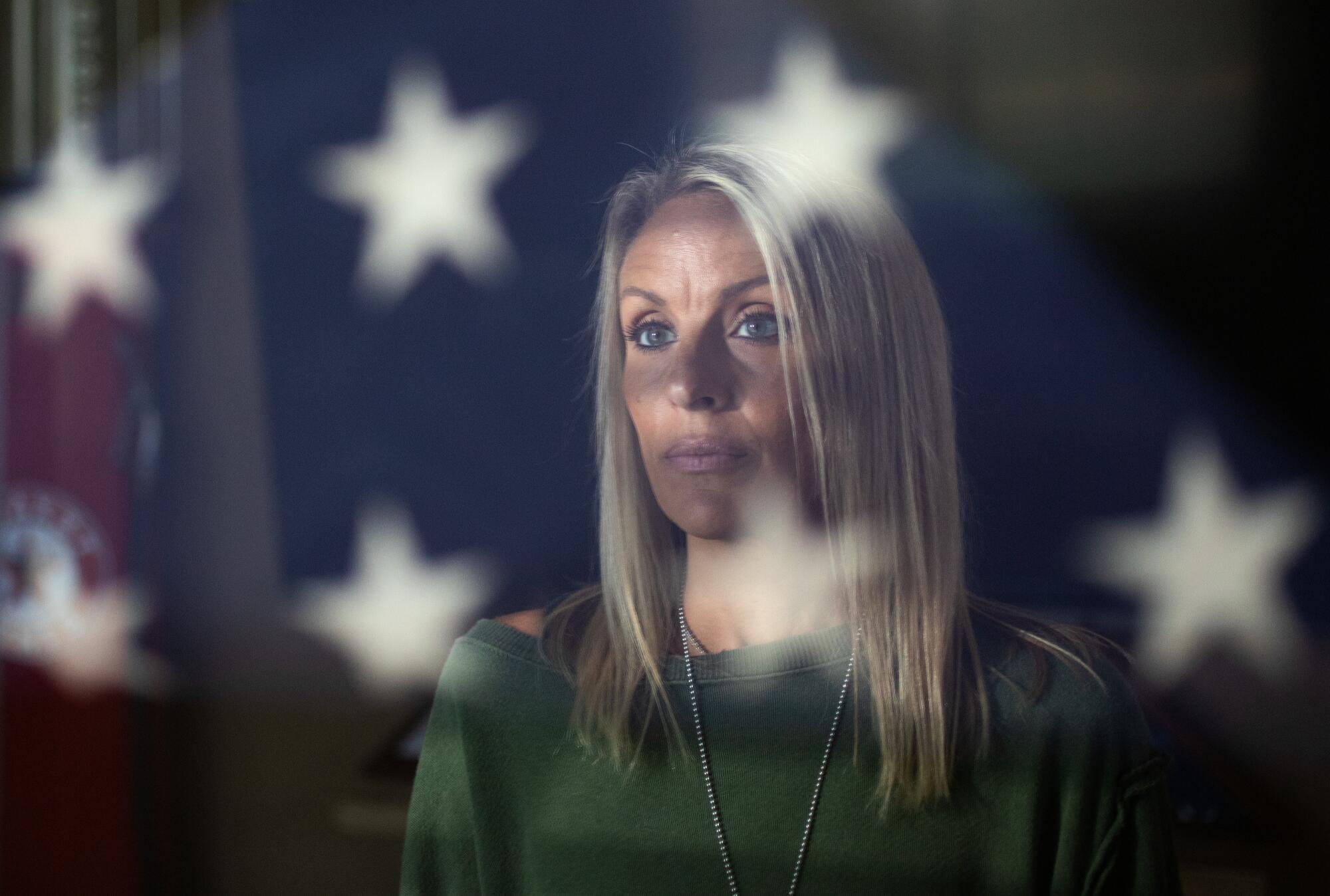
Fellow firefighters knew Carlon as a calm, easy-going family man. He got along with others and focused on doing his job and getting home to his wife and three daughters. When he was with his family, he painted his daughters’ nails and coached their softball teams.
The problems began, Heidi said, after Tatone started at the station.
Tatone, also an engineer, was Carlon’s opposite. He had a quick temper, once kicking in a door at the fire station because he was angry that he couldn’t find the key, Carlon told his wife.
To his mom, Tatone was “by the book” and a “straight arrow” kind of guy. To his fellow firefighters at Station 81, he had “an aggressive alpha male demeanor” and came across as “a bully.”
Carlon and Tatone worked different shifts. But when one relieved the other, they were expected to provide a shift “pass down,” detailing what their work day had entailed. Tatone complained to his mom that Carlon didn’t finish work that needed to get done on the engines, leaving him to complete the jobs.
In 2019, Carlon began documenting increasingly tense interactions with Tatone in his department calendar and a notebook. Once, he wrote, Tatone ignored him and later explained he was upset that Carlon and a captain had moved a television mount and hadn’t patched the holes. Carlon told Tatone he didn’t have the spackle and planned to finish the task on his next shift.
“He said we could have gone to the store,” Carlon wrote.
![Handwritten notes "Last few times he’s been hostile.” “[Chief] said just keep doing your job.”](https://ca-times.brightspotcdn.com/dims4/default/28c2c15/2147483647/strip/true/crop/3000x4000+0+0/resize/2000x2667!/quality/75/?url=https%3A%2F%2Fcalifornia-times-brightspot.s3.amazonaws.com%2Fd0%2Fbd%2F4e2786004f4c85464929ef4f02bf%2Fme-fire-station-81-carlon-notes-p4.jpg)
Tatone got upset over a flashlight that went missing and the fact that Carlon hadn’t looked for it in the nearby barn. Another time, he was angry about weeds in front of the station.
That summer, Carlon wrote, Tatone told him he didn’t like or respect him and that “things aren’t going to work between us.” He said Tatone told him the next step would be “fists flying.”
![Handwritten notes: “Is he going to twin towers it [and] fly into Tory’s bedroom.” "Next step is fists flying."](https://ca-times.brightspotcdn.com/dims4/default/2f64200/2147483647/strip/true/crop/3000x4000+0+0/resize/2000x2667!/quality/75/?url=https%3A%2F%2Fcalifornia-times-brightspot.s3.amazonaws.com%2Ff4%2Fcd%2Fa5b0afaf4d1484b87e749433b141%2Fme-fire-station-81-carlon-notes-p13-new.jpg)
Carlon said he reported the threat to Capt. Arnoldo Sandoval at Station 81. Sandoval said he informed another captain, Atsushi Uyehara, who warned Tatone that he was walking a fine line, Carlon wrote. Sandoval had the two men leave their pass-down reports on a board to limit their interactions.
Tatone seemed to clash with more than just Carlon. Another firefighter told Uyehara that he felt Tatone would be willing to turn off the hose as he fought a fire.
In January 2020, Carlon wrote, Sandoval said he had asked Tatone, who was trying to get a pilot’s license, if he was going to “twin tower it into Tory’s bedroom.” Tatone replied that it wasn’t a bad idea.
As the year came to an end, another captain at the station told a battalion chief, Mike Halverson, about the conflict between the two firefighters and asked for advice on how to address it. The captains didn’t want to be accused later of not separating the two men, Uyehara told investigators.
Halverson directed the captains to review the county’s Policy of Equity with Tatone and Carlon. Halverson also told the two men that they were required to give each other a pass-down report in person, Uyehara said.
Carlon wrote that he told Halverson he felt there was a target on his back and that Tatone might need “support for his anger or whatever issues he’s dealing with.”
Halverson, who has since retired, could not be reached for comment.
In December 2020, Tatone stopped talking to many of the firefighters at the station. Tatone’s reason why, Carlon later wrote, “is because he can’t talk to anyone who supports a Fraudulent employee.” In Tatone’s view, that would be Carlon himself.
The next spring, Heidi said, Tatone filed a complaint against Carlon with the county.
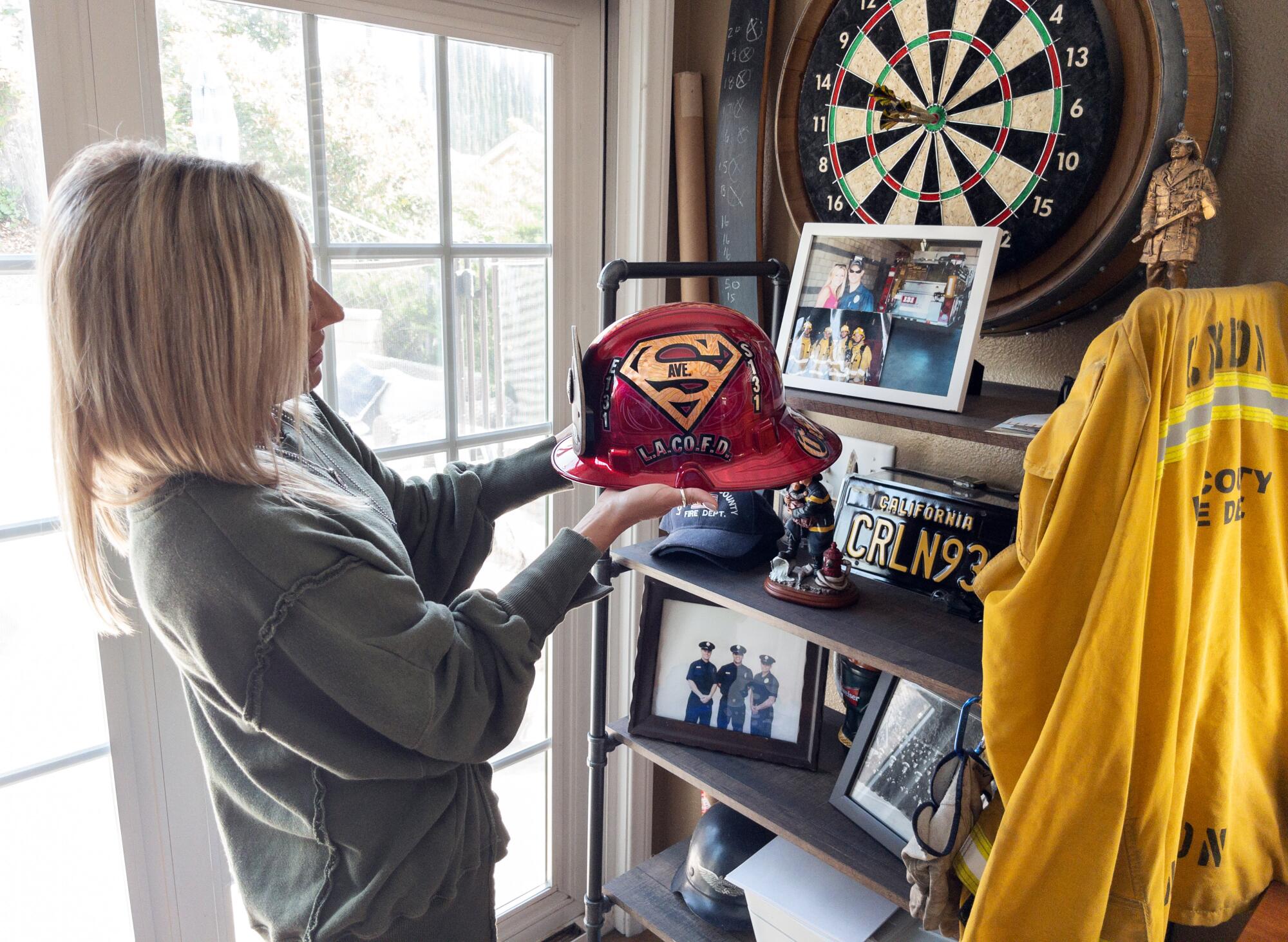
Tatone’s mom helped proofread and edit a document in support of his complaint. Over several pages, Tatone denied threatening Carlon, accused the engineer of defaming his reputation and included a laundry list of his fellow firefighter’s “deficiencies.”
“I am unsure of how I can improve the situation at this point having already involved the station Captains without a positive outcome,” Tatone wrote.
Once that complaint was made, Uyehara told investigators, “the captains felt they no longer had to worry about the issues … because they were under the impression the county would be handling it.”
Uyehara did not respond to requests for comment.
Weeks before the shooting, Tatone told Rodolfo Saavedra, a station mechanic, that there was an ongoing investigation, but that he couldn’t speak about it until it was over, according to the investigative report. Tatone said the battalion chiefs had gotten involved and both he and Carlon had been interviewed. He said they both might get transferred out of the station.
That never happened.

Subscribers get exclusive access to this story
We’re offering L.A. Times subscribers special access to our best journalism. Thank you for your support.
Explore more Subscriber Exclusive content.
Uyehara told investigators that Carlon had voiced concerns about Tatone, including that his harasser would one day shoot and kill him.
But “Uyehara felt if these were credible threats Victim Carlon wouldn’t be showing up to work and his wife wouldn’t allow him to continue going to work,” the investigative report read.
Uyehara told investigators that he spoke to Tatone about whether he planned to hurt Carlon.
“I’m not going to jeopardize my career over that piece of s—,” Tatone responded.
On May 30, Heidi’s parents, sisters and nephews came to their home for a visit. As Carlon sat in the backyard with his father-in-law, he brought up Tatone and the problems at work.
“I wonder if he owns a gun,” Carlon said.
Two days later, on June 1, a Tuesday, Carlon had just finished an overtime shift at another fire station.
He arrived at Fire Station 81 and relieved Tatone at about 7 a.m. After Tatone left, Uyehara called and left a message on Tatone’s phone, telling him he had left his food in the fridge.
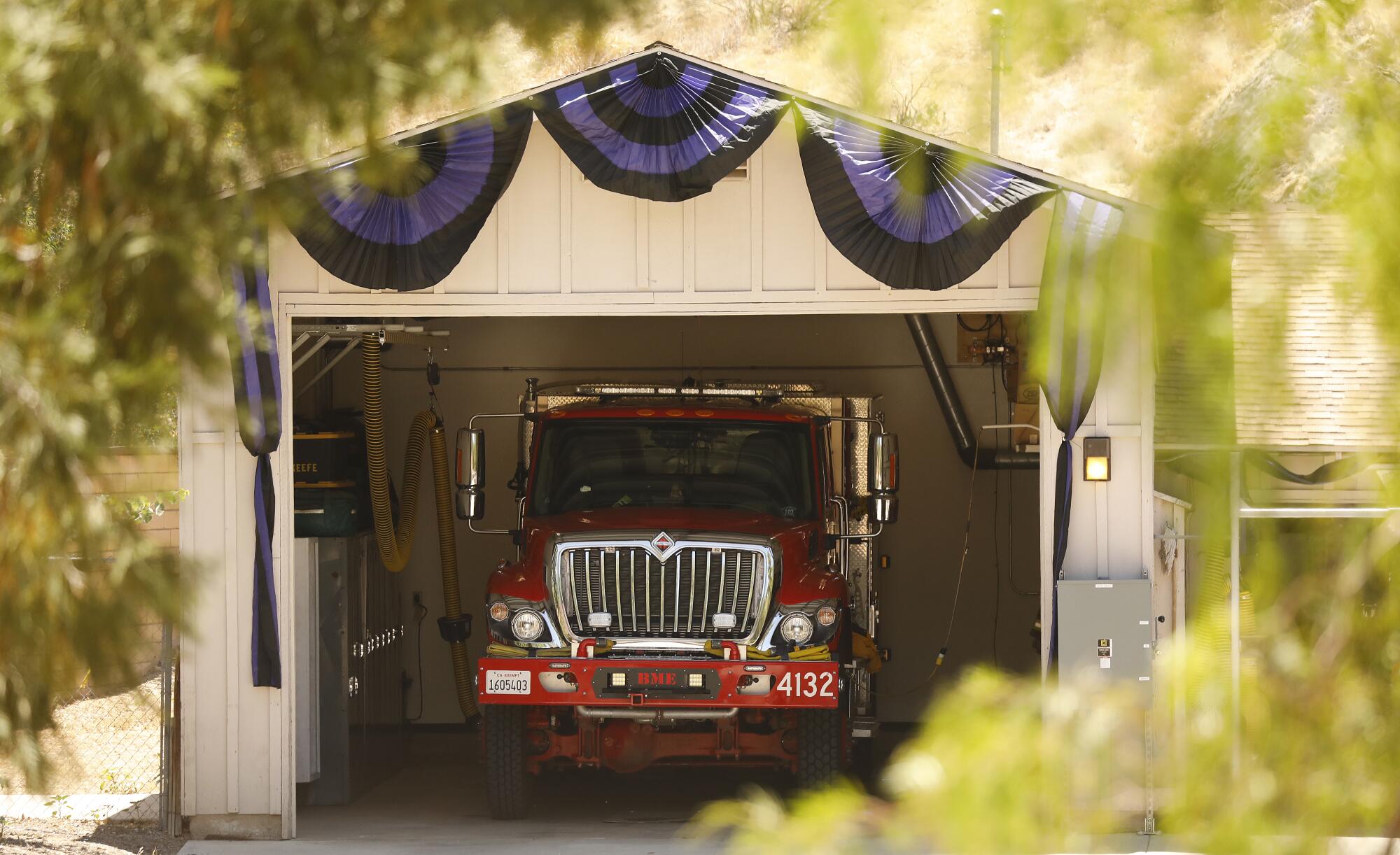
At about 9 a.m., after Heidi dropped off their oldest daughter at school, she and Carlon spoke on the phone. He told her he’d tried to talk to Tatone at the shift change but the engineer had ignored him.
The couple talked about their 17-year-old daughter’s graduation from high school — just two days away — and their plans to throw the teenager a party. Heidi told him she had a stomach ache and needed to lie down.
Carlon said he’d call when he was done working on the fire truck.
An hour later, Tatone returned to the station. He told the crew he was there to pick up his groceries. He put them in his white pickup truck and walked back toward the station.
Saavedra and Jim Sparkman, a firefighter paramedic, were working on a truck outside when they heard popping noises. Saavedra turned and spotted Tatone, gun in hand, standing over Carlon.
Sparkman began walking toward Carlon, who was moaning in pain. At first, Sparkman thought Carlon had been shot with blanks. Then he heard Tatone say “payback” and saw blood around Carlon’s head.
Saavedra took cover behind his work truck. Tatone walked by him at a rapid pace, a crazed look in his eyes.
“Don’t worry, I’m not going to hurt you,” Tatone said.
Tatone was steps away from getting in his truck when Sandoval opened the screen door and stepped out onto the front porch, drawn outside by the noise. The 54-year-old captain raised his hands in the air and asked what was going on.
Instead of leaving, Tatone turned, aimed and shot Sandoval. Sandoval fell to the ground. He tried to get to safety inside the fire station, afraid Tatone would walk back and shoot him in the head.
Instead, Tatone took off, heading northbound on Sierra Highway.
Sparkman checked on Sandoval, who was lying on the ground outside the doorway of the station.
Then, he ran to Carlon.
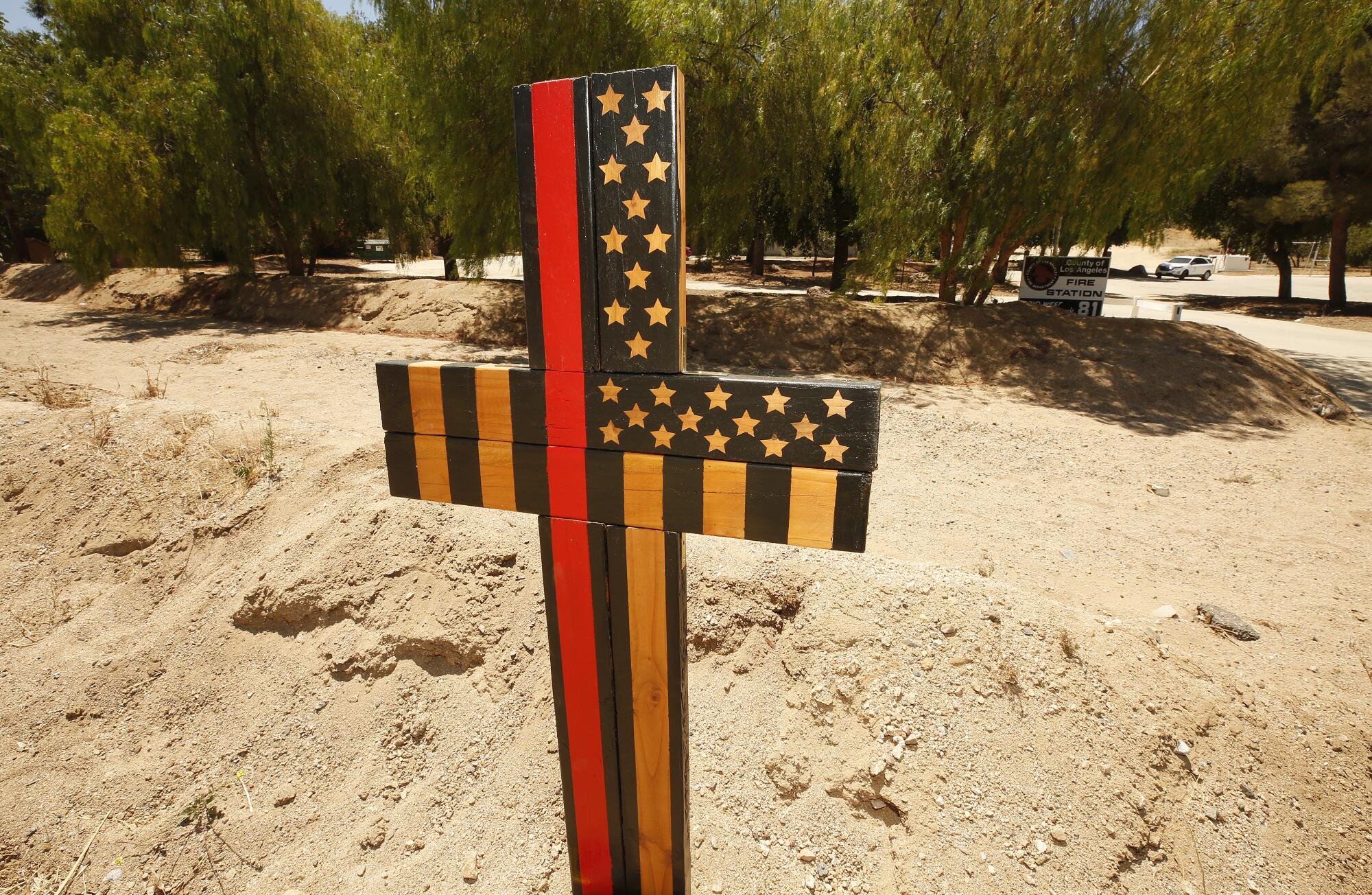
About 20 miles away, Heidi got out of bed and instinctively checked PulsePoint, a 911-connected app that shows emergencies in the community.
There was a medical emergency listed in Agua Dulce. It was at Fire Station 81. Heidi turned on the police scanner her husband kept on the kitchen counter and heard the call of a shooter at the station.
She knew immediately the shooter was Tatone and that her husband was the target.
Heidi called her husband. He didn’t answer. She called the station. No response.
Soon after, Heidi heard on the scanner that a helicopter was leaving the station, carrying a patient to Henry Mayo Newhall Hospital.
“And I thought that was Tory. I thought OK, they’re flying him. Like he’s OK,” she said. “If he’s paralyzed, whatever it is, we’ll deal with it.”
Her next thought was that she needed to grab her other two daughters, 6 and 13 years old — who were home doing remote learning — and get out of the house. She didn’t know if Tatone would target them next.
Sign up for This Evening's Big Stories
Catch up on the day with the 7 biggest L.A. Times stories in your inbox every weekday evening.
You may occasionally receive promotional content from the Los Angeles Times.
As they drove, she called Fire Station 150, division headquarters for the Santa Clarita Valley. The call came up on her car’s Bluetooth.
“This is Heidi Carlon, and I need to know what’s going on at Fire Station 81,” she said.
Her daughters listened from the backseat.
The captain who answered said Carlon was dead.
After Tatone fled the station, he drove to his three-bedroom home on Bent Spur Drive in Acton.
At 11:15 a.m. he emailed his mother: “Goodbye I’m sorry it has to be this way but I can no longer take what is going on. I love you it is not your fault.”
Then he called the county Fire Department and reported that his house would soon be on fire. He said there was a hydrant at the base of his driveway.
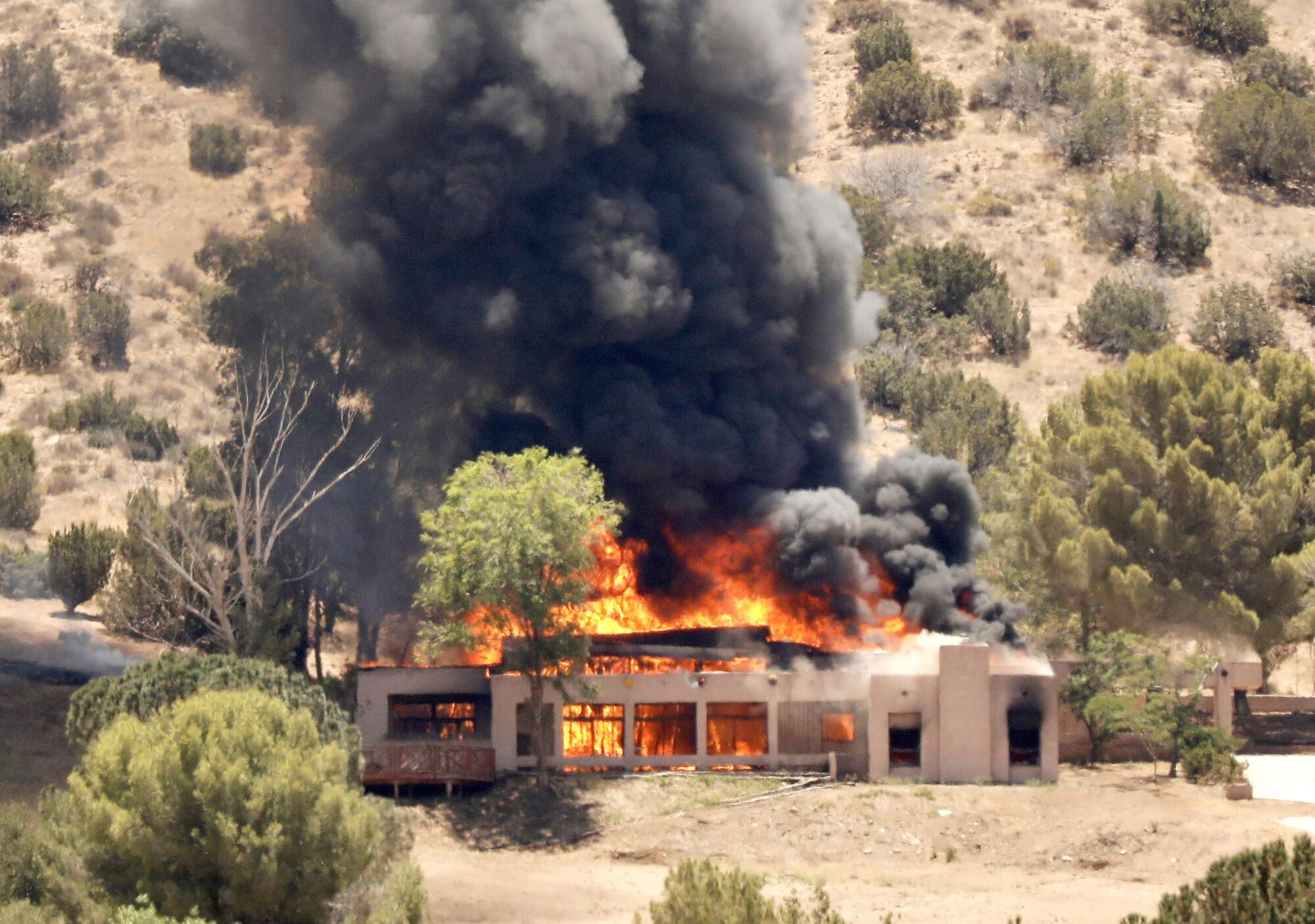
Deputies heading there to arrest Tatone for the shooting spotted a plume of black smoke. Within hours, the 3,600-square-foot home had been reduced to near rubble.
Authorities found Tatone dead of a self-inflicted gunshot wound in the empty lap pool. A pair of his boots, spattered with gasoline, had been left nearby. Authorities recovered a shotgun, two semiautomatic handguns and a revolver from outside.
An off-duty firefighter killed a fellow firefighter and critically wounded a captain in a shooting at Agua Dulce fire station Tuesday morning, officials said.
At a news conference that afternoon, Daryl Osby, then L.A. County Fire Department Chief, said he “never thought it would be me, nor our fire department family that would suffer this type of loss.”
“I always talk to the members of my organization, and I always tell them that their safety is my No. 1 priority,” Osby said. “As a fire chief, I never thought that when our firefighters faced danger that they would face that danger in one of our community fire stations.”
But interviews with witnesses after the shooting painted a troubling picture of Fire Station 81.
Saavedra told investigators that the rest of the crew worried about the conflict between Tatone and Carlon. He said “the brass” was aware of the problems. Sparkman said the animosity between Tatone and Carlon was uncommon among firemen.
Sparkman told investigators that firefighters would usually get transferred to a different station, either by choice or because they were ordered to. Saavedra and Sparkman did not respond to requests for comment.
In his interview with investigators, Sandoval described Tatone as a loner and an aggressive, angry individual who didn’t fit in with the rest of the crew. He said that more than one battalion chief was aware of the issues between the two.
The former captain has since sued Tatone’s estate alleging assault and battery, and the county, alleging negligence. Sandoval suffered serious injury; the shooting left him partially paralyzed below the waist, according to court documents.
Sandoval said he recommended to county authorities that Tatone be transferred to another fire station but that the recommendation was dismissed by the county and its supervisors “as unnecessary,” according to his lawsuit. Sandoval did not respond to requests for comment.
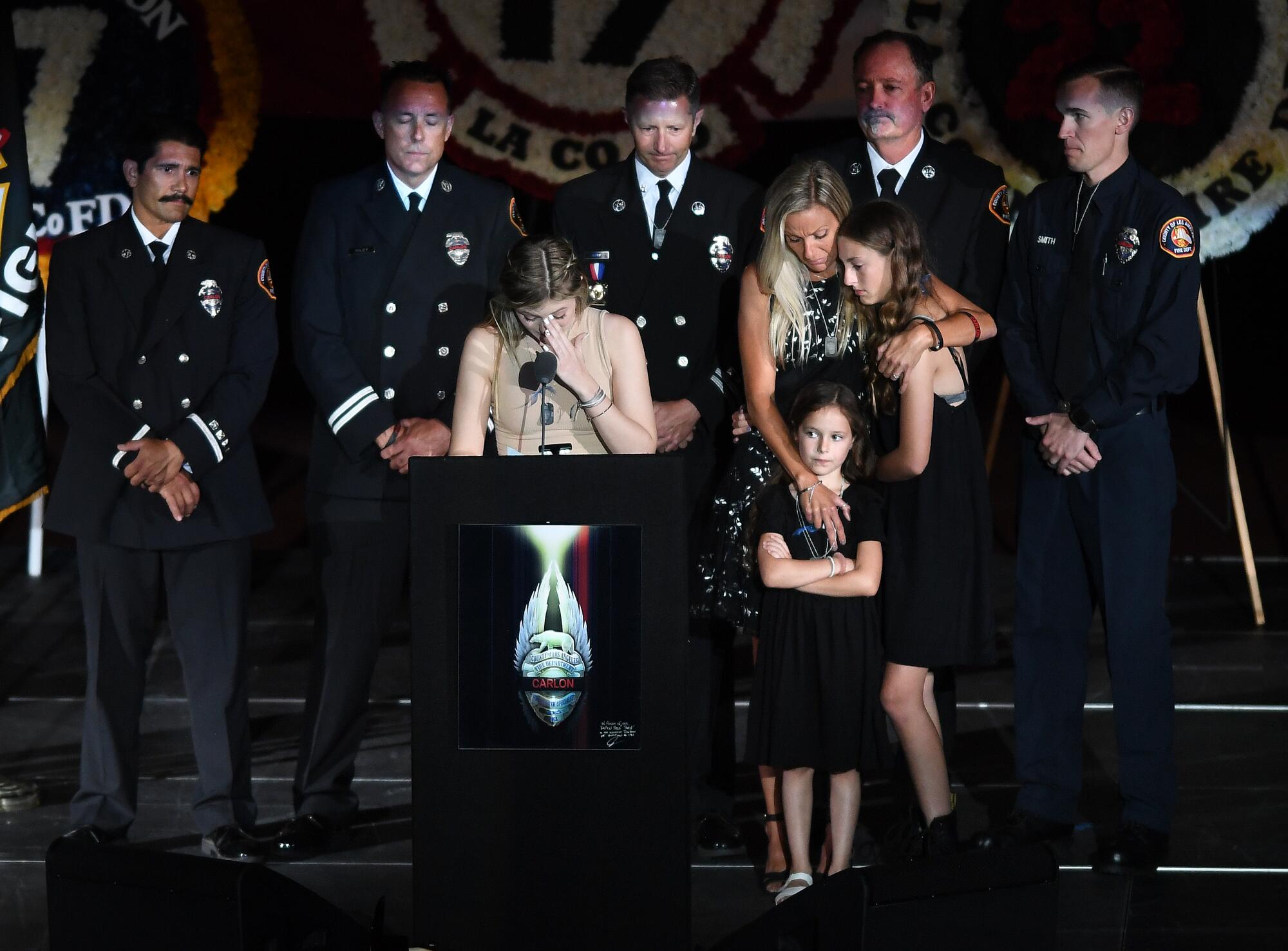
Heidi and her three children also filed a wrongful death lawsuit against L.A. County and the estate of the gunman, alleging that Tatone’s “dangerous conduct” was known to fire officials for years.
This year, on Jan. 9, a Los Angeles County Superior Court judge denied the county’s attempt to have the Carlon family’s case dismissed and ruled they could proceed with a claim against the county for wrongful death and negligence. The family’s attorney declined to comment on the case.
The family of slain firefighter Tory Carlon and a captain who survived the shooting say officials were aware the gunman posed a danger to co-workers.
“I nicknamed that station the Twilight Zone, because it was unreal what was happening there,” Heidi said, “and seeing how disheartened my husband was becoming with that station and the department for lack of doing anything.
“I mean, they allowed it. And I say allowed because they knew, they knew what was happening and chose to turn a blind eye.”
Since Carlon’s death, L.A. County firefighters have rallied around his family.
Two days after the shooting, hundreds of firefighters lined the entrance to College of the Canyons in Santa Clarita when Carlon’s teenage daughter arrived for her high school graduation ceremony. Joslyn wore her dad’s firefighting jacket over her graduation gown as she accepted her diploma.
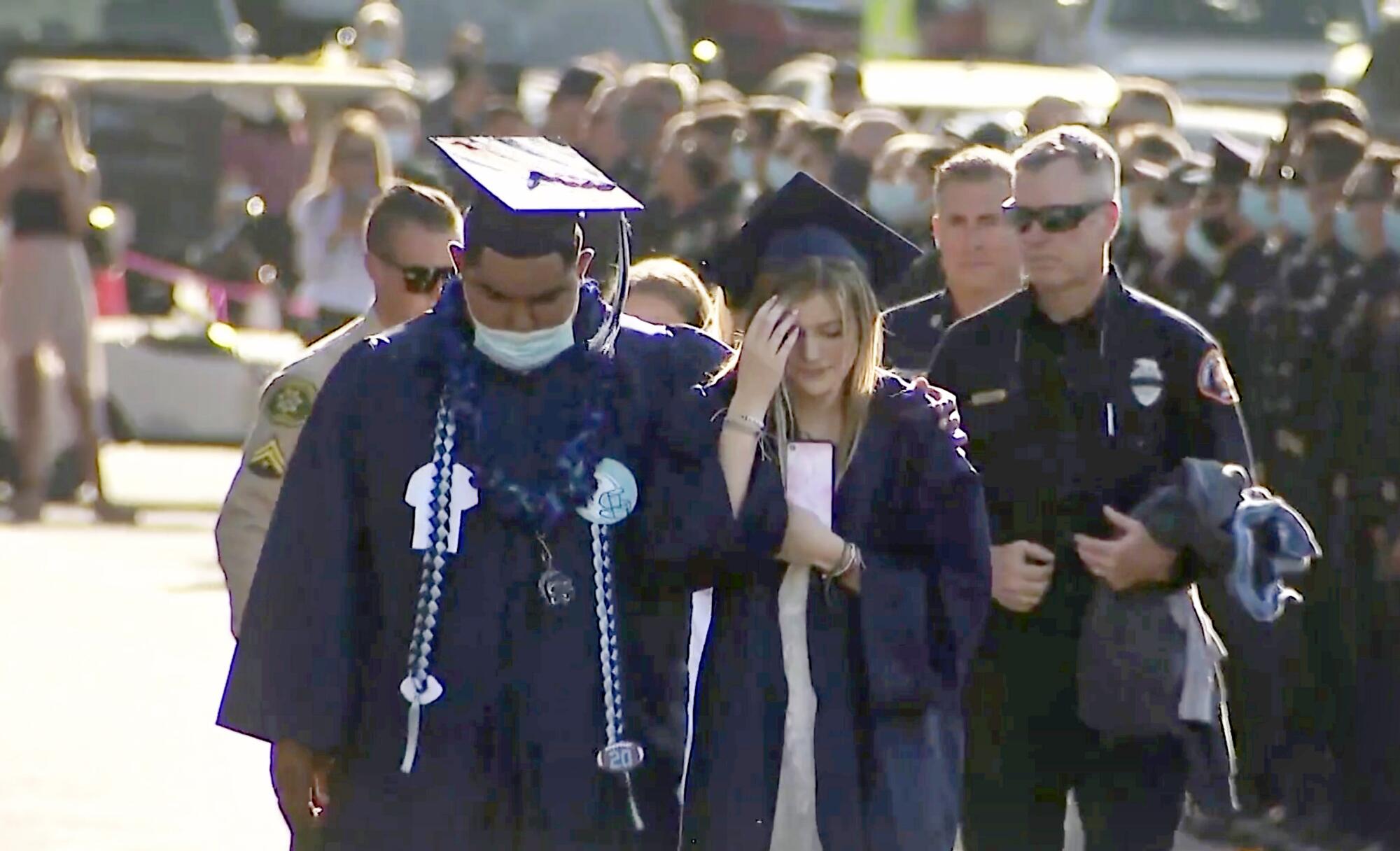
Firefighters have come over to hang the family’s Christmas lights. Those from Fire Station 111, where Carlon worked overtime, stop in to bring Starbucks.
“My husband, the thing that he loved about this department was the brotherhood,” Heidi said. “These guys ... if my girls or I needed anything, they would be there with no questions asked. They take care of us. And we’re blessed, we’re blessed in that aspect.
“I have got so much disgust for this department. But when it comes to the guys that are in the station, and doing these jobs, and really do have that true feeling of loyalty and the brotherhood, and taking care of my family — there’s so much love for them.”
More to Read
Sign up for This Evening's Big Stories
Catch up on the day with the 7 biggest L.A. Times stories in your inbox every weekday evening.
You may occasionally receive promotional content from the Los Angeles Times.

